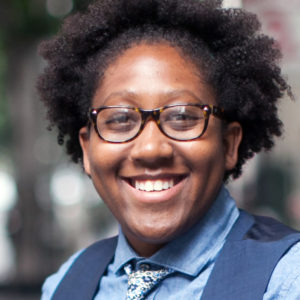Equity
Tamika Butler, Esq, Director of Planning, California | Director of Diversity and Inclusion on why Equity should be a New E of Transportation
September 6, 2019
Dive Deep into Why Equity Matters

Director of Planning, California | Director of Diversity and Inclusion
It’s a common scenario: transportation planners, who are mostly white, male, and able-bodied and have spent relatively little time with people who are different than them, ask themselves how to bring more people of color and more low-income people to the table. They question why more women don’t show up to their meetings. They don’t think about the accessibility of their space or written materials, but wonder: “How do we get more people in this room?”
The reality is that the room these transportation planners and engineers want more people in simply is not the right room.
From redlining to urban renewal to Jim Crow, many communities across North America have been excluded from the decision-making process that shaped their built environment, and that built environment has in turn cut these groups off from access to opportunity. As transportation professionals, we wonder why “the public” doesn’t understand our work or speak our language, when we should be trying to make sure we make our work accessible, relatable, culturally competent, and linguistically appropriate.
Our transportation system was built on a foundation of racism, inequity, and making sure certain groups of people were kept on “the other side of the tracks.” These inequities are alive and well today, and continue to be closely tied to race. So why would we expect people to come to us if we only hold meetings during the daytime, or don’t offer daycare or refreshments, or have the meeting notices and materials available only in English?
We can and should make our meetings better, but we also need to realize that no matter how many changes we make, the communities we want to reach are already gathering, before we ever show up. Instead of making them come to us, it’s time for us to go to the high school football game, or farmers’ market, or swap meet, or church picnic. It’s time to for us to figure out how to show up differently, in community spaces, and learn new ways of talking about our work. We have to be willing to go outside our comfort zones to be with the people we say we want to help.
Beyond that, are we willing to acknowledge that we aren’t always the experts? The data we use and our years of training provide us with valuable knowledge. But we also have to realize that our most valuable asset is the ability to listen and appreciate. Listen to the community experts who are on the frontlines of dealing with our decisions each and every single day. Appreciate the expertise that is formed from being in the community and experiencing how our work impacts people. We must realize that not all expertise comes with a degree. Once we are able to listen and appreciate, we can expand our definition of expertise and compensate those who have the most to offer—especially when what is being requested is their time away from family, work, and other responsibilities.
Equity means distributing resources to people in a just and impartial way. It’s not giving everyone the same thing, but rather giving everyone what they need today while considering how existing power structures have governed resource distribution in the past. Not everyone has equitable access to safe, comfortable, affordable, and healthy transportation options, and the burden of isolation, disconnection from economic centers and services, and traffic violence are not shared equally.
The beauty of our profession is that we have the tools to help people connect and move freely. Yet we often fail to acknowledge that this profession—and those same tools—have been used to keep people apart and stifle mobility. To make transportation equitable, we must commit to addressing historical and present-day inequities as we move together towards mobility justice.
That commitment can, and should, start with each of us. How will you address inequities in your work?
Director of Planning, California | Director of Diversity and Inclusion
The New E’s Podcast
Why have we heard so much about transportation equity in the last few years? What keeps our streets from working better for people of all backgrounds, abilities, and income levels? How can the transportation profession become more diverse, and better reflect the demographics and experiences of the communities they serve?
On episode 3 of the New E’s of Transportation podcast, Jennifer Toole, AICP, ASLA will sit down with Tamika Butler, Esq. and her guest of choice for a conversation about equity in transportation. The discussion will covers how the profession can and should incorporate equity in our work, but also how our industry must chance to be more diverse and more inclusive to really see more equitable results.
Additional Equity Resources
To Read:
How to Place Equity at the Center of Our Work, from the February 2020 “Equity” issue of the ITE Journal
The Equity Manifesto – Policy Link
Showing Up for Racial Justice (SURJ) – White Supremacy Culture
Richard Rothstein – The Color of Law: A Forgotten History of How Our Government Segregated America
Brookings Institute: To Build Safe Streets, We Need to Address Racism in Urban Design
To Watch:
Segregated By Design – Short film
Tamika Butler: Planning While Black
Delivered at the 2016 NACTO Designing Cities Conference
Keith Benjamin: Real Change At The Intersections
Delivered at the 2019 APBP Summit